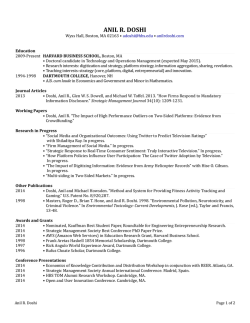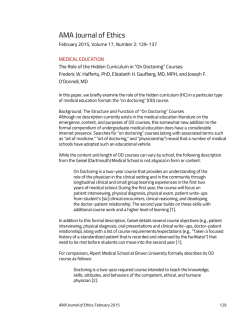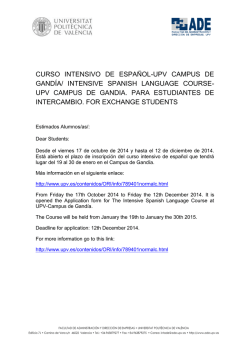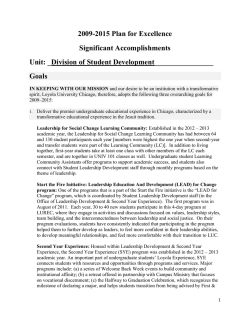
MOVING DARTMOUTH FORWARD
Dartmouth College Office of the President MOVING DARTMOUTH FORWARD President Hanlon’s Plan for Implementation January 29, 2015 Dartmouth College Office of the President Introduction In April 2014, I asked the Dartmouth community to take the lead in bringing campus life to a safe, sustainable place. I outlined a plan to address the incidence of high-risk behavior and a lack of inclusivity on our campus—to ultimately create an environment for living and learning that is conducive to Dartmouth reaching its full potential as a global leader in research and teaching. I announced the formation of a special Presidential Steering Committee of students, faculty, staff, and alumni to thoughtfully examine the issues, determine where Dartmouth could do better, and provide recommendations. In January, the Committee presented its report to me and to the Board of Trustees. Drawing on this report, I am pleased to present the Moving Dartmouth Forward plan. We will fundamentally transform residential life at Dartmouth. The vision for Dartmouth is a campus that is more inclusive, where faculty and graduate students play more influential roles in the lives of undergraduates, where students learn and grow outside the classroom, and where we have more options for social life and community interaction. A new housing model will address each of these goals, and we are moving forward aggressively to implement it. •By the fall of 2016, every student who enters Dartmouth will be placed in one of six house communities. Each community will have a cluster of residence halls as a home base, be responsible for organizing and hosting social and academic programs, and eventually, have a dedicated space for study and social interaction. Beginning sophomore year, students will reside within their residence hall cluster when living in the dorms, but even those students living in a first-year dorm, Greek house, affinity house or off-campus will be included in all community activities and events. •Each Residence Community will have a house professor and graduate students in residence. •We are committing in excess of $1 million per year to support social, academic, and intramural programming in the Residence Communities and other Collegeowned venues. Moving Dartmouth Forward 1 Dartmouth College Office of the President Simultaneously, we will explore additional avenues to create a more inclusive and diverse environment on and off campus. We will do this because it is right. We also know that a more diverse and inclusive environment will enrich our community and strengthen the academic experience, increasing intellectual growth and innovation. Whether it is by increasing diversity in faculty, enrolling a student body that is more representative or providing more social options, we will work to ensure that our community conveys a message of inclusion to every student—no matter their gender, race, orientation, or socioeconomic background. We have appointed a Vice Provost dedicated to expanding the diversity of the faculty, and have designated significant funds to support hiring faculty who are underrepresented in their field. In addition, the Dartmouth Class of 2020 will welcome additional veterans in its first-year class through the POSSE program. We will also: •Build on the E.E. Just Program to explore new avenues for attracting and supporting the most talented high school students, regardless of their socioeconomic status; •place a high priority on recruiting students from a broad socio-economic demographic as well as ensuring that financial aid is available for those who need it; and •examine ways to enhance our student support to ensure that all enrolled students are able to engage fully in the Dartmouth experience. We will promote a safer and healthier campus environment. Dartmouth has a long tradition of academic excellence. We have fostered intellectual risktaking and collaborative learning that is truly first-in-class, and we have molded leaders and problem-solvers who have gone on to great things. This is our legacy. As we move to the future, we will become ever more defined by this notion—but only if we take every proven step to provide the safest environment possible for students to learn and grow. Our community is strongest when we are open, safe, inclusive, and welcoming to all. That begins by doing everything in our power to eradicate sexual assault on our campus and to promote community awareness of sexual violence and gender-based harassment. In the last year, we have acted decisively to strengthen our procedures and adopt new protocols to both prevent sexual assault and respond as fairly and swiftly as possible when an assault is reported. We have adopted an independent investigator model for when Moving Dartmouth Forward 2 Dartmouth College Office of the President an assault is reported, as well as a zero-tolerance sexual assault disciplinary policy that includes a mandatory penalty of expulsion in extreme cases. We have also introduced a customized Bystander Training Program that engages students in preventing assault. This work has been exemplary, but there is more to do. The safety of all Dartmouth students is paramount, and our actions moving forward will build on and expand this year’s work. Beginning next year: •Dartmouth will introduce a comprehensive and mandatory four-year sexual violence prevention and education program for students, as well as a firstresponder training program for faculty and staff. We will develop this program by the end of summer 2015 and immediately begin piloting during the fall 2015 semester. •We will create an online “Consent Manual,” including realistic scenarios and potential sanctions to reduce ambiguity about what is acceptable and what is not. This Consent Manual will be in place by the end of summer 2015. •We will develop a Dartmouth-specific safety smartphone app for students to easily and immediately seek assistance if they ever feel threatened. •The College will continue to enhance our partnership with WISE, the Upper Valley advocacy and crisis center for victims of domestic and sexual violence. This partnership will strengthen our existing confidential resources for survivors of sexual assault, dating violence, domestic violence, and stalking. •We will pilot Dartmouth Thrive, a transformational College-wide program that develops leadership skills and encourages every student to focus on his or her development as a total person—in and out of the classroom, at Dartmouth and beyond, in mind, body, and spirit. In building Dartmouth Thrive, we will make use of existing leadership and wellness programs. •We will increase the presence of faculty and other positive adult influences in the lives of students. To truly create a safe environment—and one that is advantageous to learning—we will also have to tackle the challenge of excessive drinking. Dartmouth will take the lead among colleges and universities in eliminating hard alcohol on campus. Dartmouth’s new alcohol policy for students will prohibit the possession or consumption of “hard alcohol” (i.e., alcohol that is 30 proof or higher) on campus by individuals, including those over the legal drinking age, and by Dartmouth College-recognized organizations. In addition, we will ask that the entire campus community follow suit and not serve hard alcohol at collegesponsored events and be role models for the healthy consumption of alcohol. Moving Dartmouth Forward 3 Dartmouth College Office of the President The key to the successful implementation of any policy change is a clear path for enforcement. To this end, we will require third-party security and bartenders for social events. We will also increase penalties for students found in possession of hard alcohol, especially for those students who purchase and provide alcohol to minors. We will clarify and strengthen expectations of individuals and student organizations. Policies alone will not create the change we seek on this campus. True change will come from individuals—and thereby student organizations—committing to live up to a higher standard of behavior. •To clarify what we expect of individuals, every student who enrolls in Dartmouth will sign a Code of Conduct that articulates the expectations—as they relate to civility, dignity, diversity, community, and safety—for all members of the Dartmouth community. This is not meant to replace the Academic Honor Code or “Standards of Conduct”; rather, this document is intended to incorporate principles from both and serve as a powerful reminder of the values that guide the institution and our expectations of students. I have asked the Dean of the College to convene an ad hoc committee of faculty, staff, and students to draft this new code, which will be completed in time for use by next year’s entering class. We will also clarify and strengthen accountability for student organizations— including Greek organizations. Moving forward, student organizations will be held to a much higher standard than they have been in the past. I have asked the Dean of the College to form a committee of faculty, staff, and students led by the Dean to explicitly put in writing what we will expect of student organizations, particularly the rules pertaining to hosting social events, and annual review process. This work will be completed in time for implementation during the 2015 academic year. As a start, beginning next year: •We will require all student organizations to eliminate the pledge or probationary periods during which members have a lesser status. •We will require all Greek houses to have active faculty or staff sponsors (one male and one female) as well as active alumni boards. •We will require all residential student organizations to undergo an annual review Moving Dartmouth Forward 4 Dartmouth College Office of the President process to demonstrate that their structures (advisers, meetings, oversight, accountability, etc.) and programming enhance students’ academic and personal development and contribute to the health and well-being of the members of the organization and the community as a whole and promote inclusivity. The system cannot continue to exist unchanged—our students understand that and understand the need to root out extreme behavior. In fact, the proposal advanced by the Greek Leadership Council introduces more serious ideas for reform than the system has seen in 50 years, and comes on the heels of good ideas that are already working, including last year’s initiative to delay entry of first-year students into Greek houses for the first six weeks of fall term. I am optimistic that we will see even more collaborative work in the future. Of course, we are also quite aware that past promises and plans for reform generated by Greek organizations have not always led to substantive and lasting changes. If, in the next three to five years, the Greek system does not engage in meaningful and lasting reform, and we are unsuccessful in sharply curbing harmful behaviors, we will need to revisit the system’s continuation on our campus. Moving forward, it will be simple: Individuals and organizations that choose not to fulfill these higher standards will not be a part of our community. We will strengthen academic rigor while enhancing learning outside the classroom. Our vision is for Dartmouth to be a place of around-the-clock learning, a place where every experience contributes to building leaders with the wisdom for a complex world. At the same time, remaining at the forefront of teaching and learning requires us to consistently increase the rigor of our curriculum, and doing so can have a positive impact on student life and behaviors. To achieve this vision: •I am asking the faculty to consider a number of ways to increase the rigor of our curriculum—from curbing grade inflation, to not canceling classes around celebration weekends, to earlier start times for classes on Tuesday and Thursday mornings. •We have signed on to the Aspen Institute’s Franklin Project, which helps admitted students find Gap Year projects if they wish, and moving forward we will be investing more heavily in additional educational opportunities. Moving Dartmouth Forward 5 Dartmouth College Office of the President •We will be investing an incremental $1 million each year in experiential learning— both to support faculty in their efforts to design and evaluate programs and to expand current efforts and seed new ideas. In allocating these funds, priority will go to areas in which Dartmouth has a strategic advantage, including outdoor programs that cultivate leadership and understanding of the self and the environment, programs that involve our outstanding professional schools, programs that take advantage of the flexibility of our academic year, and programs that encourage partnerships between students and faculty in the pursuit of making a difference in the world. We will be accountable. To ensure that these actions do in fact mark a turning point in our history, we are taking the following steps: •I have asked an external Oversight Committee, to be chaired by Tufts President Emeritus Larry Bacow, to evaluate our progress. The Committee will report annually to me and to the Board of Trustees on two questions: Are we carrying out the steps that we said we would? And are these steps working to reduce extreme behaviors and promote inclusivity? •Simultaneously, we will be conducting two regular climate surveys and publishing the results to ensure that our work is having its intended impact. Beginning in April 2015, we will conduct the AAU Sexual Assault Climate Survey on a regular basis, along with a Dartmouth campus climate survey in the fall of 2015. We will be transparent about our progress. And we will reevaluate and retool these steps as needed to reach our end goal. I have outlined the path that I believe we must take to Move Dartmouth Forward to a future where students are free of extreme behaviors and part of a safe and healthy environment; where we foster inclusivity through a variety of options for community building and social interaction; where students are 24/7/365-day-a-year learners; and where students continue the tradition of independently organizing and defining the social scene—but with greater accountability and engagement with the faculty. Moving Dartmouth Forward 6
© Copyright 2026




